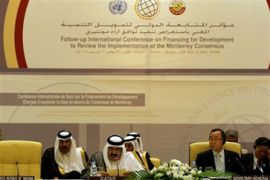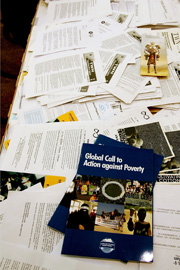A guide to the Doha UN summit
Participants will review progress made since the 2002 Monterrey Consensus.

 |
| The Emir of Qatar Sheikh Hamad bin Khalifa al-Thani, left, hosted the conference [AFP] |
The Doha-hosted UN summit on Financing for Development is a follow-up meeting convened to review progress made since the 2002 Monterrey Consensus that adopted pledges on six key themes.
Following the negotiations between member states, which conclude on December 2, the UN will publish an outcome document detailing what has – and has not – been achieved in all six areas and what needs to happen next.
The six focus areas include:
Mobilising domestic resources
The main thrust of this point – also referred to as The Global Deal – is that sovereign nations accept they are primarily responsible for their own economic development and spending priorities.
Keep reading
list of 4 itemsWhy are nations racing to buy weapons?
Parallel economy: How Russia is defying the West’s boycott
US House approves aid package worth billions for Ukraine, Israel
However, developing nations and aid agencies say tax evasion – also referred to as capital flight – by large multi-nationals is depriving states of billions of dollars.
They argue it is impossible for countries to take primary responsibility for their economic development if they cannot properly control their tax income.
However, this principle acknowledged that developing countries could not do this in a vacuum and should be supported in their efforts to achieve this.
While the main purpose of this chapter is to set the tone of the overall agreement, there are ongoing discussions about how to best support developing economies without damaging other developed countries.
Foreign investment
| Monterrey: key issues |
|
The 2002 Monterrey Consensus was the result of a UN-sponsored conference on financing for development. Unlike the current Doha summit, it was attended by 50 heads of state including chiefs of the IMF and World Bank. The Consensus established pledges on six themes:
|
Also known as the chapter on mobilisation of private capital.
One of the guiding principles behind aid initiatives since the 1990s has been that market-driven investments should be a key driver in assisting poor countries to develop their economies.
There are a number of sticking points within this chapter of the document – not least that many members believe the economic landscape has changed so much since 2002 that foreign investment itself needs to be reconsidered as a viable form of assistance.
There are other disagreements about established investment conditions including investment guarantees – where foreign companies have a certain amount of profit guaranteed by the developing state.
This has been criticised as forcing poor countries to assume an unfair burden of investment risk.
Aid agencies and developing nations argue this hampers a poor country’s ability to invest in social services, training and key infrastructure that would enable it to run its own industries.
Multi-nationals argue it allows for development and building up of key industries in the first place.
Sovereign wealth funds – where countries with surplus foreign currency build up a state-owned investment fund – have also become a point of contention.
Developed nations have called for some of this cash to be pumped into aid budgets but many middle economies point to the G8’s refusal at Monterrey to donate from revenue driven by pension and hedge funds.
In addition, some developed nations are seeking to have remittances – money sent home by nationals working overseas – included in investment totals.
Developing nations reject this because it is private income that they say they have no control over.
Trade
The main point of contention is the continuation of trade subsidies in developed economies, perhaps most notably for agricultural industries.
The Doha Development Round talks in November 2001 concluded that anti-protectionist principles and free trade ideologies should apply equally and globally.
Within these discussions there is also considerable debate about free-market ideology-based conditions attached to financing and investment deals for developing nations.
Official development aid (ODA)
The key negotiation point in this chapter examines who defines the level of aid is required by a country, how it should be delivered and disbursed and how to measure whether it was effectively used.
Currently, the Organisation for Economic Co-operation and Development (OECD) has a body which addresses these concerns, but there have been complaints that it should be managed by another more representative organisation – possibly one operating under the auspices of the UN.
All developed European states have pledged to donate 0.7 per cent of gross national income by 2015. The 0.7 per cent ODA target was originally set in the 1970s and is now enshrined in the UN’s Millenium Development Goals (MDGs). The US has not formally adopted the figure of 0.7 per cent as a target.
Members also disagree on what qualifies and quantifies as aid and accuse developed nations of including investment activities or emergency funds in their overall aid totals.
This is often referred to as “aid inflation”.
Debt
 |
| The talks will examine how to measure effective aid [Getty] |
There is an ongoing debate between debt cancellation and measuring debt sustainability.
To cancel or restructure debts countries have their level of debt calculated in order to work out whether they can manage the amounts they owe.
Developing nations and agencies argue a broad export income to debt level measurement does not take into account other commitments that need revenue – such as meeting the MDGs by 2015.
They say current debt arbitration groups, such as the Paris Club, can impose harsh conditions without giving the indebted nation much of a say in how it will have to repay debts.
Activists and developing nations are calling for a new, neutral debt arbitration mechanism to be established.
Systemic issues
This covers three broad areas: firstly, the Bretton Woods Institutions, the World Bank and the International Monetary Fund (IMF), secondly, the financial, food and fuel crisis, and, thirdly, climate change and the MDGs.
The most controversial by far is proposed reform of the World Bank and the IMF.
Some members are calling for a firm commitment to hold a Bretton Woods II conference to reflect new world realities since those institutions were created in the 1940s.
Developing nations believe they are unfairly represented on the board of both the bank and the fund and are calling for urgent reform alongside greater UN involvement.
Poorer countries also object to conditions imposed on loans by the fund and the bank which are informed by free-market ideologies and restrict states’ spending priorities and resource allocation.
 Domestic resources
Domestic resources